SEEKING: NYC-area women 21+ with inspiring stories for portrait painting series by Adesina:
Know a woman who fits? Send her this way!




LOGISTICS:
WHAT YOU’LL GET: Fine art photography shoot with professional hair, makeup & styling. Reference photo for highly detailed painting to be exhibited publicly.
TO APPLY: Submit via form: CLICK HERE>> (opens in new tab)
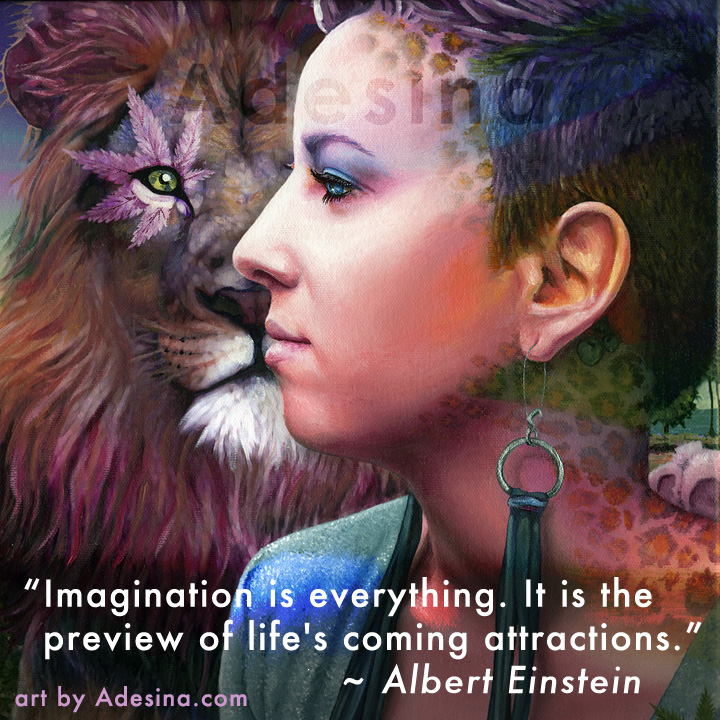
THE GOAL:
This is a collaborative, heart-centered project celebrating YOU. We’ll work together to ensure you feel comfortable and authentically represented. You choose whether to be credited by name or remain anonymous.
ALL TYPES NEEDED – IF YOU HAVE AN INSPIRING STORY, READ ON!
We are creating ROLE MODELS for the next generation of women, by reimagining historic female archetypes we don’t often see in today’s media, and inspiring young women to BE THEMSELVES, pursue their calling, and not follow the herd.
ARCHETYPES WE’RE CASTING:
NOTE: This isn’t about conventional beauty; it’s about celebrating the power and wisdom that comes from lived experience. I have deep respect for your story and am honored to help bring your archetype to life. – Adesina
Submission form: CLICK HERE>> (opens in new tab)
Good luck and we look forward to your submissions!
Usage:
The photos will be used as reference images for a series of paintings which will be shown publicly and made available for sale. You may or may not be recognizable in the final painting. Not every photographed subject will make it into a final painting. The photos themselves, your written or spoken story, as well as behind the scenes video taken at the shoot, may be displayed publicly in Adesina’s portfolio, social media, and website, for behind the scenes purposes, but will never be sold. Artist reserves the right to display and use the photos & your written story (you can be credited by name or remain anonymous — that is up to you) for the above mentioned purposes in perpetuity.
It doesn’t matter if you’re a creative professional who likes working on your own schedule, or a nine to fiver managing highly confidential client accounts; burnouts are a thing! When it comes to artists and creative folk in particular, burnout is sometimes related to a lack of inspiration.
Personally I’ve felt burned out on numerous occasions in my career and have found that there are things we can do to re-inspire ourselves and get those creative juices flowing again. I’m going to share some of those with you here over the course of this blog. Bonus: This is really two blog posts in one, because at the end, I’ll share one final way to stay creative (making prints), that will add a new facet to your art business in the process!
Inspiration for an artist is where all the beautiful and captivating work springs from. Without it, creating becomes a lot harder, if near impossible. How does one overcome the feeling of burnout and proceed to re-inspire? Here are some tips that can help.
At times, amidst a burnout, you might have a fleeting idea when you least expect it. At these times you would probably wish you had your art supplies or tools close by. Well, why can’t you? Keep your basic supplies close at hand. Even when on the go, carry a sketchbook or moleskin. This way, you can catch that fleeting inspiration when it comes and build on it later!
As many artists would know, there are times when a process has you studio-bound for days, if not weeks on end. This is all well and good, however if the walls of your studio start closing in and your feel inspirationally dry ? Get out! Immerse yourself in some spontaneous activity. Hit the city center, go get yourself some ice cream, talk to a stranger. Basically, live a little. Life is full of inspiration and there is no telling where it might come from!
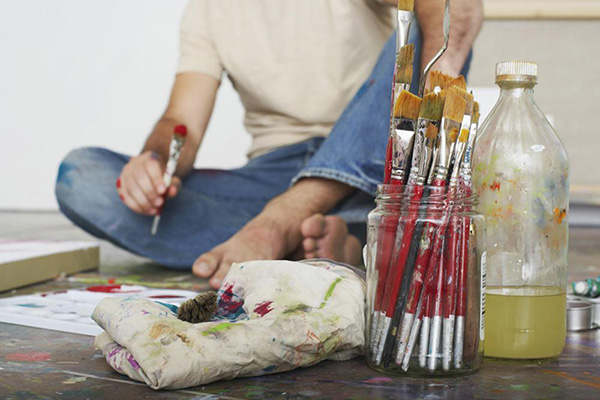 Artist sitting on the floor with their brushes
Artist sitting on the floor with their brushes
At times as artists, we get a little caught up in our technique and pursuing perfection. The trouble with this, is that at times we can become self critical to the point of stagnation. If this is the case with you, and you find yourself shooting down your own work before you even begin, lighten up. Take out your paints or whatever medium you use, and make a mess — on purpose! Have at it. Get the clutter out, and the good ideas will surely flow!
If you’re feeling a little tired of the medium you’re working with, shake things up a bit! Try out another medium or even another art form entirely. Your mind is vast and there will likely be more ways than one to re-spark your creativity. I like to rotate entirely different mediums on a regular basis: ceramic sculpture on day, oil painting the next, and then a quick pencil sketch on the weekend — like this one below, that I drew recently!
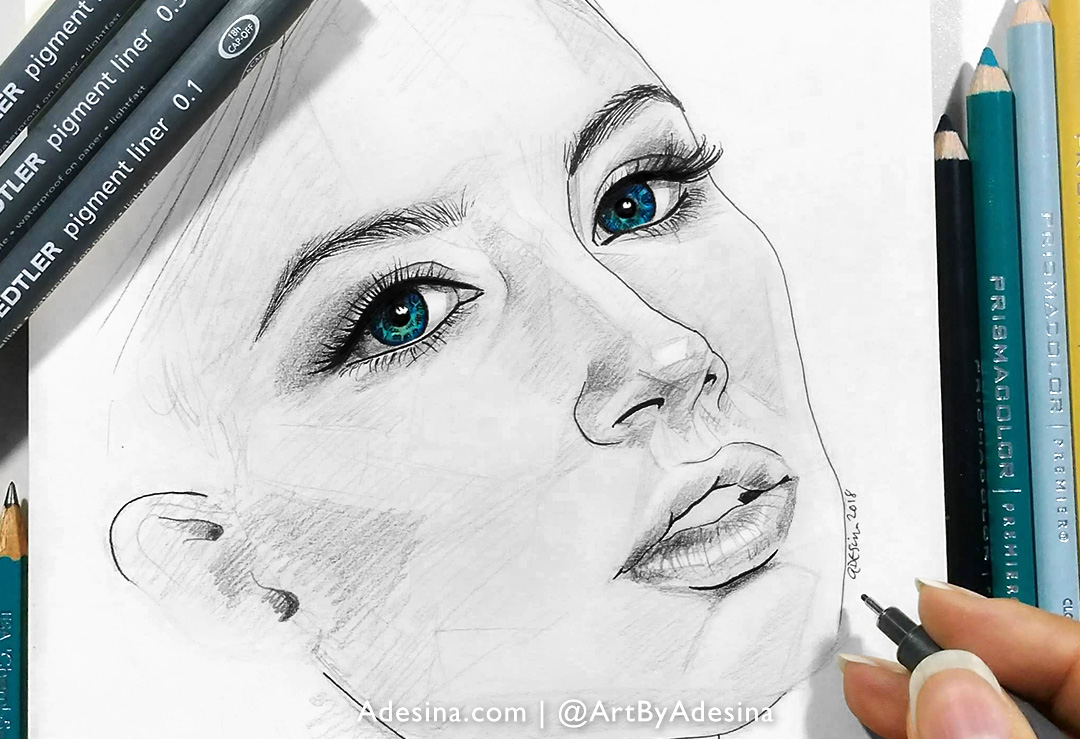 Artist Adesina sketches a young woman with sea green eyes.
Artist Adesina sketches a young woman with sea green eyes.
Observing and taking in other works of art is actually quite inspiring. You might have heard of artistic responses. An artistic response is work done by one artists inspired by the work of another. If you feel you’re running short on inspiration, visit some of the local galleries or connect with other artists to view their work.
You can even look for original artwork for sale, (or prints if you’re on a budget), that you can put up in your own studio, and surround yourself with art to inspire and uplift you! My skull framed art prints (see below) are among my most popular pieces with my fellow artists. And if you’re local, there’s always a lot of brilliant artwork for sale in NY that you could check out and possibly use to re-inspire yourself. I recommend hitting up the galleries down in Chelsea, and once you’ve found something you like, you can wrap up your afternoon with a stroll down the Highline — a perfect close to an inspiring day!
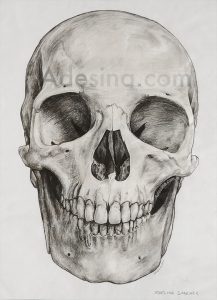
Skull, Poster-size original skull art by Artist Adesina | Buy a Print
Still can’t find that spark of inspiration to create something new? Well, why not re-invent something old? Creating prints out of your favorite pieces of art is a great way to stay productive & creative, without the pressure of having to make new work. And if you plan to eventually license your work for products, a lot of the steps you must undertake to make prints, will help you with that as well.
First, depending on the size & shape of the piece & the size of the prints you want, you’ll have to decide if you want to scan or photograph your work.
Very large pieces, and pieces that have 3D elements, might work out better with photography. Make sure you have good (sunlight or artificial light that is daylight temperature), even lighting, and that there is no glare on your artwork if it’s shiny. When I was creating my skull framed art prints, for example (see below), the graphite was super shiny on camera, and although that was ok for displaying the original piece on my web site, I knew that it would be terrible for prints. So I had to re-take the photo, using indirect lighting that came from several angles: diffuse lighting from a set of large windows in front, and three daylight-temperature photography lights positioned around the room, which I pointed away from the drawing, and bounced off the ceiling and walls. It was quite a setup, but it was really worth it, and saved me so much time later in Photoshop.

Moodily lit photo of Adesina’s original Skull drawing 🙂 — Too much shine for prints!
For photos, also make sure that you are using a good, high-resolution camera; a DSLR is great. Plus, be sure that you are using a lens that minimizes distortion. I personally have an 85mm lens that works well for just about all my medium to large works. I also recommend a tripod, so that your shots are crisp and clear.
For smaller pieces, you should scan them in with a high-resolution scanner (600 dpi or more) that is equipped to handle details. Epson and Canon make excellent scanners that last a long time and have great color fidelity. Alternatively, you can take your work to be scanned commercially, but be prepared to pay for quality. I find that in the long run, it makes more sense to invest in a good quality scanner, than to constantly have to outsource your scanning.
Whether you scan or photograph your work, you should still adjust the images afterward in Photoshop. If you don’t have Photoshop, there are a few other programs that might work, however Adobe PS really is the industry standard and makes this work infinitely easier. I believe a subscription is under $10/month at present for the program, although you should double-check before signing up.
Put your artwork in front of you, and compare it to the image on your computer. Do they match up? For photos, pay special attention to the proportions of the image: are the edges straight? Is the image stretched horizontally or vertically, or are the proportions correct? Use guidelines to help you line things up, and turn on rulers so you can measure. For scans, you may have had to assemble multiple scans into one image using Auto Blend; if so, did the merged result come out correctly, or are there tweaks that you need to make where the layers come together?
Next, look at color. Again, make sure you are looking at your original art in good, even, daylight-temperature lighting, and compare it to what you see on the screen. Do the colors match? Instead of editing the actual pixels, use Adjustment Layers like Hue/Saturation, and Curves, to alter the colors of your work. This way you don’t damage any pixels and can easily reverse any changes you don’t like. Also utilize masks and channels if there are only certain parts, or certain colors, that you want to change. Again, this is preferable over chopping up the actual pixel layers, because a mask is easily removed, and also results in a smaller file when you save the PSD.
Finally, you may need to sharpen your image before printing. Again, you must use your artist’s eye to determine if this step is necessary, but if it is, I recommend using the Smart Sharpen filter; and, if the image is not too big, I also like converting a flattened layer of the finished image into a Smart Layer first and THEN applying the filter. This last step enables you to continue to adjust or remove the filter after applying it.
After you are satisfied with how your digital copy looks, you will have to export a flat copy to print. What format you want to use, depends on what service you will print with. If you are doing professional, limited edition giclee prints, I recommend being in direct contact with the print shop and even sending them the PSD file, to make sure they have exactly what they need. For print on demand services like Zazzle or Fine Art America, check their guidelines on their web site, to see what size and format they need.
Some popular formats for art prints are: Jpeg, Tiff, PDF, EPS.
In the past, print files were usually CMYK, but nowadays, some print services are requesting RGB images, that are normally only reserved for on-screen use. Again, check with the print service you are using, for their requirements.
If you have a good printer at home and are printing yourself, then you might want to experiment to see what gives you the best results. First, check your printer’s instructions to see any recommendations the manufacturer may have regarding art prints, and the type of paper you are using. Secondary to that, in my experience 8 bit Tiff files, at 300 dpi, CMYK, have looked best on my own personal printers.
Once you have exported a flattened version of your image, you’re all set to go! Print it out, or send it to your print service. And of course, don’t forget to update your web site with your new offering! Congrats, you now sell prints :).
There are many other ways for you to get re-inspired. It’s really about getting out there and figuring out what works for you best! As an artist; true inspiration is really within you, it’s just a matter of finding out what helps you connect with it.
Found this article helpful? Then share it using the sharing tools below. Or leave a comment and let me know what tips you are going to use to get your creative juices flowing, or if you have any questions. I love to help my fellow artists succeed!
Be well,
Adesina <3
We’re really big on using art to make statements on things that hold relevance in the world today. In a world where the personal is political, art stands as a brilliant way to trigger and engage in political discourse.

One of the more salient facets of art, is the personal element. Different artists go through different processes; the culmination of the artistic process being the work itself. There is no one correct way to go about producing a piece of artwork. That being said, when using your art to make a political statement, there are a few tips and pointers we’d like to share on how to go about it!
As mentioned earlier, the intricacies of your artistic process are yours and yours alone. On the flip side, there are certain items to keep in mind, that can really help you make a political statement through your artwork.
The first thing you want is clarity. Be very clear on the political statement you wish to make. Because you are working with visual elements rather than words, often the end meaning will be up for grabs, as your art will be subject to interpretation by the viewer. So considering that eventuality, it’s best to at least start off as clear as possible, in order to minimize misinterpretation later. Writing up a preliminary summary of what you hope to communicate, as a first step, is an excellent way to refine your own ideas on the subject, and will help you make the statement effectively!
It is incredibly important to be informed before you make a political statement in public, and that goes for all activists, regardless of medium. If for example, the statement you wish to make is linked to a certain situation, research that situation and its historical context. Discover the details that can both inspire and be incorporated into your artwork, and make sure you that understand what really occurred, so as not to base your opinions on false assumptions.
It always helps to be very specific when it comes to making a political statement through your art. Once you have crossed the research phase, you should have ample material to work with. If the political statement you’re trying to make is on environmental degradation for instance, find out specific situations that you can depict in your work which convey the right message.
The more specific you are, the stronger your statement is likely to be!

Once you’re clear on the message and the image or object you wish to make, determine what medium and style would be best for your subject matter. Is it a specific scene or person, whom you would need to render in great detail, or realistically, in order to make your point? Or are you more concerned with an abstract concept regarding your subject matter, which would be best executed in a looser style or with unconventional materials, like found objects or household items?
Make some sketches, and don’t be afraid to play with different materials to make mockups and maquettes. Being clear on the medium can help you better plan your work, as does understanding what style you wish to employ!
Last but not least, when it comes to making political statements through your work, where and how you display it, can very much be a part of the message you’re trying to get across. Open public spaces for instance, where there is a high degree of human traffic, can be ideal when it comes to putting out a loud political piece!
Art is a great way to make a political statement, and depending on how you go about it, it can be extremely effective. If you enjoy political artwork and are looking for images and sculptures that inspire both thought and social action, feel free to check out artist Adesina and her growing collection of artwork for sale in NY at Adesina.com! Sanchez’s work is layered, well informed, and politically driven, while being both aesthetically appealing and emotionally inspiring.
– The Adesina LLC Team
There is nothing morally wrong with creating art for the sake of art. The creation of something visually captivating and aesthetically appealing is never a bad thing. That being said, art is an extremely powerful tool for communication.
Art has the ability to fill in where words fall short, and can make a huge impact. Art can be used to communicate concerns, ideas and opinions, on subjects that are important and relevant to society, or even just to convey one’s own personal feelings. Artwork can serve as compelling commentary on the state of the world at large.
Many of us wonder how to add more depth and meaning to our work. One dimension that could potentially be expanded to enhance our artistic output, is that of purpose. There is so much more that you can communicate via your art, by fueling and directing it, with a relevant cause or message that you wish to put out. This gives you, and your work, purpose.
In this post, we will elaborate a bit on one possible route you might take during such an artistic, purpose driven process.
There are many causes worth taking up and fighting for in our world today. Some of the more commonly known, include fighting against animal cruelty, racism, and sexism; as well as advocating for women’s rights, children’s rights and environmental conservation.
Think about what is important to you. Find your cause, understand what it’s about, and then allow it inform your artistic process.

You need to figure out how you wish to communicate that which you feel is relevant and important. Get a sense of what medium or mediums you want to work with. Will it be a public display or something more intimate? What kind of impact are you looking to make with your work and how will you go about achieving it?
These questions are important to ask while you are deciding both your medium and your style, and before you begin the actual work.
Last but not least, while actually working on your painting, sculpture or other work of art, let the cause you care about, inform your creative process. Let it influence your choice of color, stroke and composition; allow it to reveal itself in the shapes on your page or canvas, or in the folds of your clay. And while creating work that is overtly about the subject matter in a very obvious way is definitely a clear way to go about it, remember that sometimes it is not a blatant message, but simply the essence of the matter, that is enough to make the impact you’re looking for. Symbolism, abstraction, and allegory are fabulous tools in that case.
Like we said, there is no evil in creating art for the sake of creating art — so many artists have done it, and will continue to do so. However, creating art with purpose, is what the world needs more of! If you’d like to see some inspiring artwork for sale in NY, lovingly created with purpose, then check out artist Adesina’s commentaries on ecology (Bleak Future), mortality (original skull art), and equality (I Have A Dream 2013), or give us a shout on social media (@ArtByAdesina on most platforms) or our contact form, for more gorgeous, heartfelt material!
– The Adesina.com Team
Art has been used to instigate, support and bring about social and political change for a very long time. Today, artists the world over, use their skills and expertise to spread awareness as well as to comment on a host of global issues.
Since some of my readers might be confused or unclear about how art has the power to bring about and encourage change, I’m going to elaborate on that a little over the course of this blog.

There are so many smaller elements that make up the whole; and if you go through each of the headings below, by the end you will see how collectively each contributes to the overarching effects that art has on society.
By providing us a safe space to explore, art helps teach us to try new things, understand different perspectives and challenge norms and rules that we might have grown up with.
By providing inspiration, art can push people to do better, be better, and evolve, as well as face and conquer various problems they are faced with.
Being a form of expression, art encourages people to come out with what they are holding onto within. Often times this brings likeminded folk together. When together, like minded folk, with ideas on how to improve the world around them, get things done.
Art can be used to discuss and dialogue on matters which could otherwise offend people to the point of violence, in a lighter, more psychologically acceptable way. In other words, it can be used to challenge wrongful acts and injustices, without offending.

Whether you’re appreciating art together or creating it, a sense of community is formed. Art brings people together and encourages personal involvement. This paves the way for timid yet highly intelligent individuals, who want to take part in meaningful causes, to do so. The interaction helps breed confidence and further productive action!
Another amazing trait of a good piece of artwork, is that those interested will endeavor to understand the deeper meaning in the work. It doesn’t matter if you’re following the life of an artist or analyzing their use of color and style of stroke. The skills you’re honing, are those of critical thinking and analysis. Both are crucial when it comes to sociopolitical involvement and action!
We don’t all speak the same language, but a sculpture, a painting, or other thought/emotion provoking piece of art work can be understood by most. Even if it does not look appealing by conventional standards, the ability of a piece of art to evoke a feeling, is what communicates its meaning.
Art is a language understood by people the world over, regardless of background, educational history or age.
Though on their own these elements might not seem consequential, together they set the stage for the ways in which art can create and inspire critically thinking, socially active, as well as socially empathic, human beings. It is individuals like these, who both on their own, and collectively, push and rally for change the world over! And this, is why I as an artist, am driven to create.
If you would like to purchase affordable art prints, sculptures, paintings or ceramics, while supporting meaningful causes, then please feel free check out my site, Adesina.com, or give me a shout on social media: @ArtByAdesina on Twitter, Facebook, Instagram, Pinterest, DeviantArt, YouTube, and various other platforms.
xoxo,
Adesina
What is the importance of Art in our lives?
Art enables us to find ourselves and lose ourselves at the same time. It changes the way we see the world and everything around us.
Keep on reading to find out how great art can help us define our very lives, and share this infographic with anyone who would like to see the many wonderful ways that art has shaped and reflected society <3.
xo,
Adesina

50 years ago yesterday, Dr. Martin Luther King Jr. was assassinated at 6:01pm on the balcony of his room at the Lorraine Motel in Memphis, Tennessee. That day, we lost one of the greatest leaders in history.
And with all that has happened in the interim: from wars to peace protests, from globalization to technological advancements; Dr. King’s messages of equality and civil rights and non-violence remain relevant. Yet, no leader of the same caliber and reach has emerged in his absence. Where are today’s leaders, who can push society forward in greater increments, the way Dr. King did?
Two weeks ago, in Washington DC, a little girl from Alexandria stood in front of the nation at the March For Our Lives rally, and spoke her mind:
Her name is Naomi Wadler, and she’s eleven years old. Please watch her speech below:
Regardless of where you stand on gun violence (and at the very least, I’d like to think we are all united in wanting to curtail needless deaths, even if the methodology is often a point of contention), it is undeniable that this young lady is incredibly well-spoken, and brave, for being so young and articulating her thoughts on a national stage, and for organizing a walkout at her elementary school.
And while I would never compare a child to any of our great leaders of the past, every leader was once a child too, and seeing our young people stand up for what they believe in this way, gives me great hope for the future, and for a better world. We need more children (and adults) like Naomi! I hope she continues to speak out and make a difference; she has tremendous potential.
I hope you like my drawing of this incredible little girl; please feel free to share it! At this time it is not for sale.
xoxo,
Adesina
Hello my loves,
As Women’s History Month comes to a close, I wanted to share one of my recent sculptures, focused on the female form, which is currently drying in my studio & awaiting a coat of varnish and a patina: “Objectification (I).”
If you have a moment, here is her story:
In the aftermath of the #MeToo movement earlier this year, I’ve been thinking a lot about what it means to be a woman, in a culture where sexual predation still occurs, yet somehow has been ignored in certain sectors, for so very long. Especially since I have been working in the entertainment industry as a television host for the past 13 years, and even having been introduced to the “casting couch” myself (to which I said “No thank you, I’ll pass” lol), the entire movement hit very close to home.
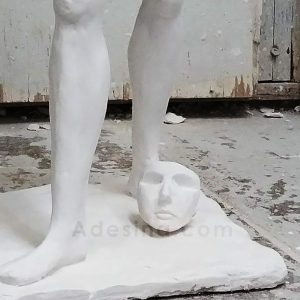
Objectification I sculpture by artist Adesina – legs, feet and face only.
This sculpture, a nude woman, her face neatly removed as if through a futuristic, bloodless surgery, and placed by her feet, is not so much about sexual assault in and of itself, as much as it’s about the erasure of women’s identities, in the midst of all these accusations and public outcry. It’s about how it feels to be exposed to the world, with one’s story of sexual abuse or harassment, and being made into just one of a huge number of interchangeable women – angry women, mistreated women, scared women, women who were in the wrong place at the wrong time, or women labeled as just plain stupid, or manipulative even, for having been in these situations in the first place, and for either disclosing, or not disclosing, after the fact (and in many cases – you are wrong no matter which you choose).
It’s the objectification not of the body, but of the mind & of the soul, which leaves one naked and alone, even as we stand strong, and our voices rise together; so that we remain faceless, in the aftermath of a movement that we put so much hope into, and of which we have yet to see what the far-reaching outcomes will be.
Once the sculpture is completely dried and a patina applied, I will post more about her, with some video of the process, which if you have ever casted a clay sculpture in plaster, you know is quite an ordeal hehe!
Thank you so much for reading, and if you’d like to place a bid on this piece before it’s done (thus securing her for yourself in advance) please contact me here.
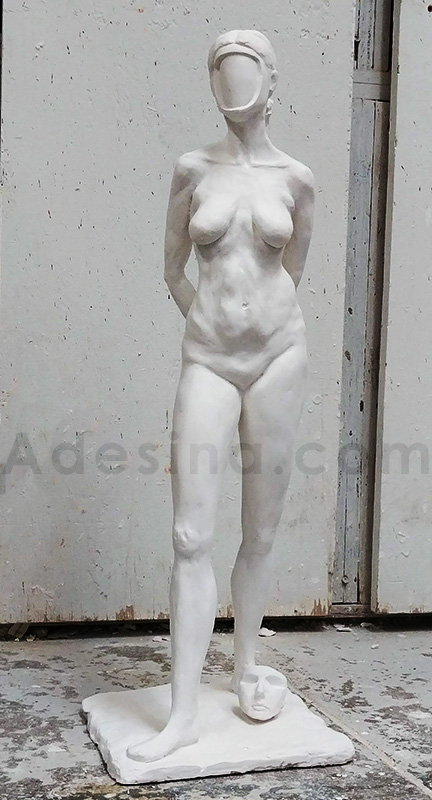
Complete sculpture – Objectification I – by Adesina.
Much love,
Adesina xo